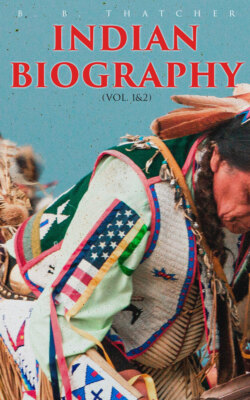Читать книгу Indian Biography (Vol. 1&2) - B. B. Thatcher - Страница 13
На сайте Литреса книга снята с продажи.
Footnote
Оглавление[1] Stith.
[2] Allusion seems to be made here to a custom which is sufficiently singular to deserve some description. Smith calls it a yearly sacrifice of children. A ceremony of the kind which was performed near Jamestown may best be described in his own words. "Fifteene of the properest young boyes betweene ten and fifteene yeeres of age, they paynted white. Hauing brought them forth, the people spent the forenoone in dauncing and singing about them with rattles. In the afternoone they put those children to the roote of a tree. By them all the men stood in a guard, each hauing a Bastinado in his hand, made of reeds bound together. This made a lane betweene them all along, through which there were appointed fiue young men to fetch these children. So euery one of the fiue went through the guard to fetch a childe, each after other by turnes, the guard firecely beating them with their Bastinadoes, and they patiently enduring and receiuing all, defending the children with their naked bodies from the vnmerciful blowes, that pay them soundly, tho' the children escape. All this while, the women weepe and cry out very passionately, prouiding mats, skinnes, mosse and dry wood, as things fitting their childrens' funerals. After the children were thus passed the guard, the guard tore down the trees, branches and boughs, with such violence that they rent the body, and made wreaths for their heads, or bedecked their hayre with the leaues. What els was done with the children was not seene, but they were all cast on a heape in a valley as dead, where they made a great feast for all the company. The Werowance being demanded the meaning of this sacrifice, answered that the children were not all dead, but that the Okee or Divill did sucke the bloode from their left breast, who chanced to be his by lot, till they were dead; but the rest were kept in the wildernesse by the young men till nine months were expired, during which time they must not converse with any, and of these were made their Priests and Coniurors." Master Pory says, in his Observations that the Accomacks were a civil and tractable people: "nor doe they vse that deuillish custome in making Black Boyes."
[3] Stith.
[4] Burk.
[5] Stith.
[6] Belknap's Am. Biog. p. 64, Vol. II.
[7] Purchas V. 1792.
[8] Stith.
[9] Ancient Records of Virginia.
[10] Beverly's History, p. 49.
[11] So write some historians, but as he is understood to have been younger than Powhatan, the estimate is possibly too large by ten or twenty ears. It is said that Berkeley had proposed taking him to England, as a living argument to counteract the representations made in that country as to the unhealthiness of the Virginian climate.
[12] Beverley.
[13] Burk, Vol. II.
